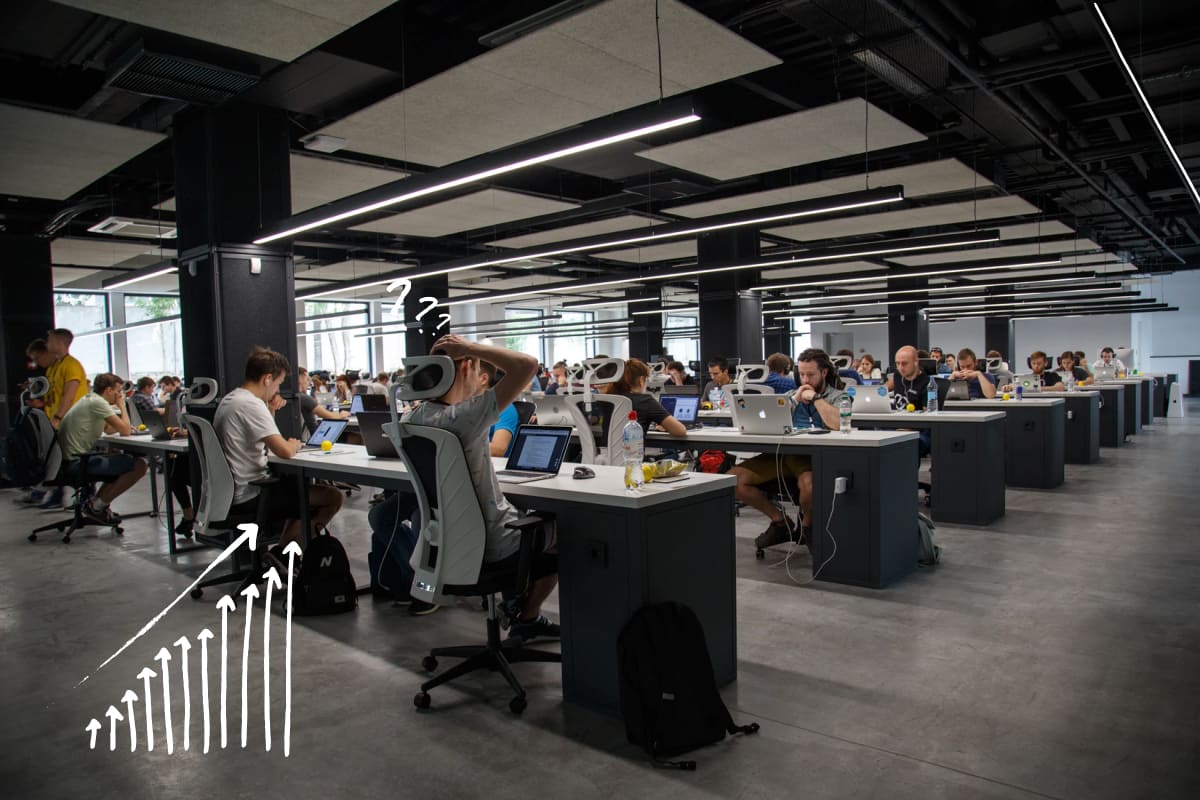Remote work was a global movement before the coronavirus pandemic and only accelerated with it. According to Gallup, nearly 60% of U.S. employees working from home want to continue to do so. 90% of remote workers plan to stay for their careers.
Employees like remote work arrangements because it offers more flexibility and autonomy, both in location and working hours. Remote work doesn't have to mean working from home. It could mean working from a coffee shop, co-working space, or internationally by taking advantage of remote work visas.
Employers also benefit when they support remote workers. Employers who embrace teleworking aren't sacrificing performance. They benefit from decreased costs and lower environmental impacts to higher productivity and employee retention.
This article outlines the benefits of remote work for employees and employers.

14 benefits of remote work for employees
Remote work offers many benefits for employees. You'll be aware of many of these, but you may be surprised with remote work's impact on the economy and planet.

1. Better work-life balance
Many remote jobs offer a flexible schedule that lets you start and end your workday when you want, as long as your work is complete.
A flexible schedule is great if you work better at uncommon times. Some people work best at night while others prefer early mornings. Regardless of whether you're a night owl or early riser, you know how beneficial a flexible schedule can be for productivity.
Control over your schedule is also invaluable when life comes up. Whether that's dropping kids off at school, doing the laundry, hitting the gym, or simply taking a break, your personal life is easier to manage when working from home.
However, lines can blur between work and home life if you're not careful, which is why fully remote companies encourage employees to maintain a healthy work-life balance. Maintaining balance is a learnable skill and one of the essential skills of remote work.
Even if you are bound to a specific work schedule, remote work still allows things that aren't possible for traditional office workers, like a quick vacuum during lunch, a power nap, or even controlling the temperature of your office space!

2. Control over your commute
The average one-way commute time in the U.S. is 27.1 minutes, equating to nearly ten days commuting to and from work each year. Extreme commuters face commute times of 90 minutes or more each way and spend over a month commuting each year. Commuting is a time sink and source of stress and anxiety.
According to Time, health issues associated with commuting include:
- Increased blood sugar levels
- Higher cholesterol
- Greater depression risk
- Increased anxiety
- Lower happiness and life satisfaction
- Temporary blood pressure spikes
- Higher blood pressure over time
- Lower cardiovascular fitness
- Worse sleep
- Worse back pain
Even if you don't plan to work from home all the time, commuting less has health benefits. You can use the time you save to get enough sleep, spend more time with friends and family, exercise, or cook healthy meals.

3. Work from where you want
Fully remote workers with no set location can live wherever they please. Some remote workers have left home altogether and live as digital nomads, traveling and working from new locales as they please.
Related: Remote work visas for digital nomads
Even if you work for a remote company that binds you to a specific time zone or country, you can still move to cheaper cities or prioritize lifestyle rather than proximity to the office. People who have to move frequently, like military spouses, can also benefit from having a remote job.
You don't have to move around as a remote worker. You might prefer to work from your favorite coffee shop around the corner, while visiting family, or outside instead of a cubicle.

4. Access to more opportunity
Access to opportunity is one of the most significant benefits of remote working. Remote workers have access to more job opportunities than office workers bound by geographic location. If you like living rural or in a small town, you no longer have to move to a city to get access to well-paid jobs.
Look at the depth and breadth of remote jobs available. As Dror Poleg wrote in No Floor, No Ceiling: "Geographical constraints no longer protect the average from the best."
Suppose you're an excellent software engineer, writer, or any other position you no longer have to leave your home to find work. You can live where you want.
If you're not sure where to start, read our articles on finding a remote job and getting hired and how to get a remote job with no experience.

5. Improved inclusivity, diversity, and exposure to different cultures
Removing the requirement to live within commuting distance of an office means remote companies often have more diverse and inclusive teams. Remote work gives people who may have a hard time getting a job at a traditional company more opportunities.
People with disabilities, caregivers who need a flexible schedule, or stay-at-home parents need to balance work and family.
Not to mention that everyone wants to or can offer to live in cities, so remote work tends to expose you to people from different socioeconomic, geographic, and cultural backgrounds who can provide different perspectives.
A great example of this is GitLab which has remote employees in over 68 countries! Unless you work in a large multinational, it's impossible to have that level of diversity in a company constrained by geography.
Remote work also means you can work from a community where you feel most comfortable and supported, rather than a community close to the office.

6. Lower cost of living
Remote work makes it easier to avoid paying expensive rent or a large mortgage. In the past, getting a high-paying job required you to move to a city with a high cost of living. Now you can earn an excellent salary without living in a metropolitan area, which means you can save a lot of money.
The money you save could be put to financial independence and retiring early, holidays, taking care of your family, or enjoying yourself.
Rent isn't the only way you'll save money. The average American commuters spend as much as $5,000 per year on their daily commute when you include the cost of gas, maintenance, public transport, etc.
There is generally less need for professional attire, which means you don't need separate wardrobes for work and life. Not to mention the money you'll save on coffee, lunches bought, and after-work drinks. These expenses add up and put substantial money back into your pocket.

7. Earn more money
Research from PayScale that controlled for job title and location found employees who work remotely make 1.9% more than their equivalent office workers. Overall remote workers earn 23.7% more than non-remote employees when excluding job title and other compensable factors.
Owl Labs' State of Remote Work report supports these findings, showing 26% of remote workers earning more than $100,000 per year versus 8% of on-site workers. In other words, remote employees are 2.2x more likely to make a salary over $100,00 when compared to on-site workers.
Pair the higher salary with the possibility of a lower cost of living, and remote workers have a substantial financial advantage over on-site employees.

8. Lower environmental impact and improved sustainability
The coronavirus pandemic and the behavioral changes it brought on (less travel, lockdowns, and working from home) led to slowed deforestation rates, reduced air pollution, and improved water quality.
Given 1 in 4 Americans or approximately 39 million people were anticipated to work remotely in 2021, we can expect the impact of greenhouse gas emissions associated with commuting to continue to be suppressed.
KPMG estimates 13 to 27 million people will continue working from home in the coming years, which will reduce commuting (and associated emissions) by 70 to 140 billion miles each year.
Not only will this benefit the planet, but it'll also benefit our health. Air pollution has many adverse effects on health outcomes and general morality that are widely documented, not to mention the high cognitive costs.
You're doing your part to make the world a happier and healthier place by working from home!

9. Control over your office environment
Working from home means creating an office space that works for you. If you want a more ergonomic chair, music playing at a particular volume, or a hotter or cooler temperature, it's in your control. You can make your home office into whatever you want.
Related: Home office upgrades

10. Improved productivity and performance
While remote work isn't without its challenges, it tends to have fewer interruptions, less noise, and more efficient meetings, increasing productivity. You'll find you get more done when working remotely. You can control your environment and don't have to worry about co-workers asking you a quick question, obligatory socializing when you grab a coffee, or offending someone by putting your headphones on to escape an open-plan office.
Conventional wisdom states that open offices promote collaboration and save money, but open-plan offices are penny-wise and pound-foolish. There is overwhelming scientific consensus that open-plan offices reduce productivity by at least 15%.
Remote workers can focus on what matters, their job.

11. Happier and healthier life
Remote working gives employees more time and control to make healthy choices. With no commute, no lunch rush, and no long hour away from family, the remote workforce tends to be happier.
A study from the American Sociological Review shows flexible remote workers tend to sleep better, feel healthier, and experience less stress. A report from the New York Times on the study showed these positive effects cascading down to the employees' children. Children sleep better and report less stress when their parents have a flexible schedule.
In addition to personal health and wellbeing, co-worker and manager relationships tend to be more positive without the distractions and politicking of an in-office job.

12. Self-sufficiency and better writing
Remote employees rely on asynchronous communication to collaborate with colleagues who live in different time zones, which means you won't necessarily have someone online to help you. When you can't always rely on someone else to help you, you develop the skill of looking for the answer before asking for help.
You can still ask questions and get help, but a lot of the time, it's faster to Google it or search your company's remote employee handbook to find the answer yourself.
Remote companies also tend to rely on written communication to collaborate, so you'll end up a better writer who knows how to work across time zones.

13. Strong bonds with colleagues around the world
A common misconception is that people who work remotely are lonely. In reality, the opposite is often true. A range of communication tools for remote workers like Slack, QuizBreaker, and PulseMate make it easy to create strong bonds with colleagues who live in different time zones.
If you play video games, you know you don't need to be physically near someone to build a real friendship. One of the best parts of remote work is when you get to visit a colleague's country, and you have a friendly tour guide to show you around!
You'll also make the most of the real-time interaction you have with colleagues. Rather than interrupting them while they're in flow, you might instead write up a memo outlining your plan then call a meeting to discuss once everyone has read it. Pre-reading before meetings saves time and ensures you don't waste the time you spend together on context gathering.

14. Less office politics
It's impossible to avoid office politics, even as a remote employee. However, many remote workers skip the gossiping and posturing of the traditional work environment.
Because remote teams rely heavily on effective communication, remote workers tend to be great communicators, reducing the risk of misunderstandings and politicking.

7 benefits of remote work for employers
Remote work isn't going anywhere, so it's vital that employers understand the benefits and why they should support it.
If you're looking to hire remote talent, be sure to check out our guides on how to attract, hire, and onboard remote employees.

1. Increased employee productivity
Employers often grapple with the question: "If I can't see my employees working, are they?" The answer is yes.
Employees already bring work home after hours, finish presentations over the weekend, or catch up on email while waiting in line. Most of your employees are already working remotely in some fashion.
Remote workers aren't lazy. They're generally more productive. Skipping the commute and open-plan office gives employees more time to focus on their work and leisure, increasing productivity.
A report from Airtasker based on the habits of 1,004 workers shows remote employees devote more time to work tasks and breaks throughout their workday. A two-year study conducted by Stanford professor Nicholas Bloom in conjunction with C-Trip supports Airtasker's findings, showing telecommuters to have a productivity boost equivalent to a full day's work every week compared to in-office colleagues.
This increased productivity comes down to happier, healthier, and more rested employees and fewer distractions, saving time for deep work and problem-solving.
Other employees benefit from the flexibility provided by asynchronous communication. They can work the hours that suit them, whether in the morning, middle of the day, or late at night.
Many employers had to test remote work due to the coronavirus pandemic and found no dip in productivity, despite the stress and uncertainty associated with a global pandemic. Imagine the potential of remote work in better conditions.
Other long-term studies conducted by Gallup Research, The University of Melbourne, Harvard Business School all support the findings of Nicholas Bloom and Stanford University and point to the same thing: remote employees are more productive.
To learn more about the benefits to employee productivity, watch Nicholas Bloom's TED talk above.

2. Lower costs
According to Global Workplace Analytics, employers who allow employees to work from home part-time save about $11,000 per year per employee, a number that would increase for fully remote employees.
Companies save money on real estate costs, transit subsidies, in-office perks, and the other expenses associated with a physical location. At the extreme, Google likely saved over a billion dollars in 2021 because employees worked from home due to reduced costs related to promotions, travel, entertainment, and in-office perks.
Fewer employees in the office mean fewer costs for businesses, as they can condense their real estate footprint and use workspace more efficiently.
Depending on the size of your business, supporting remote employees could produce significant savings without radically restructuring your company.
While remote employees generally earn more than their in-office counterparts, 36% of employees would choose the ability to telecommute over a pay raise. You can also hire people who live in cheaper locales if you don't plan to use location-agnostic pay.

3. Easier recruitment and access to a larger talent pool
Traditionally, companies have limited their hiring to people within commuting distance of their office. Unless you're a large company, you're competing with companies with more resources to outbid, out-perk, or out-cool you. For businesses outside of metropolitan areas, finding employees can be difficult.
Companies that support remote working and work across time zones have the world at their fingertips.
They can hire a UX designer in Sydney, a developer in Bali, and a customer success manager in Toronto. In other words, they can hire the best person for the job, regardless of geography. Removing geographic obstacles means you'll get the best applicants possible for each job and have a more diverse workplace.
The best person for the job probably doesn't live within commuting distance of your office and might not want to move. Hiring remote talent means you can find the most uniquely suited person for the position.
If you're looking to hire remote talent, consider posting a job on Himalayas.
Supporting remote work can also make it easier to attract talent. Many employees got a taste of remote work during the COVID-19 pandemic, and the majority want to continue to work remotely.
EY found more than 50% of employees would quit their job if not provided post-pandemic flexibility. Other research supporting EY's findings include:
- Valoir: 40% of workers would prefer to work remotely full-time in the future)
- Zenefits: 77% of job seekers consider flexible work arrangements when evaluating future job opportunities
- Gallup Research: 54% of U.S. workers would quit their current job for a remote one
- International Workplace Group: 80% of U.S. workers would turn down a position that didn't offer flexible working
- Toptal: In the first nine months of 2020, Toptal, a remote freelancer marketplace, saw the volume of applicants wanting to join its freelance network increase by 55% compared to the same period the year before.

4. Increased employee satisfaction and better employee retention
Employee retention is an issue for businesses of all sizes. The longer employees stay with a company, the more valuable they become because they understand the business, market, and competitors. Not to mention that the average cost of onboarding a new employee is between 6 and 9 months' salary
However, employee tenure is shrinking, and it's only about two years for millennials.
Supporting remote work is a great way to increase employee retention. According to Owl Labs' State of Remote Work, companies that support remote work experience 25% lower turnover than those that don't.
Not only do you give employees more work-life flexibility, but you also give them a chance to develop leadership abilities by increasing autonomy and responsibility. These are things every great employee wants.
Remote work also means that your best employees won't leave the company if they move somewhere else.
When employees are free from the office, they have the opportunity to manage their priorities and time, which shows them that you trust them to work when, where, and how they want. When you trust your staff, they turn in better work, are more engaged, and stick around longer.
Think about the incentives you currently offer to retain talent. Do you have a cohesive benefits package? A great company culture? Employee health benefits? Quarterly bonuses for the best employees?
All these are great, but the option to work remotely is different. It shows employees that you trust them to get their work done, care about their work-life balance, and value them as a person.
Offering remote work is one of the most effective non-monetary ways to retain talent that benefits the business.

5. Better disaster preparedness
A permanent remote workforce means your business can run even if there is a natural disaster, local or national emergency, or a global pandemic. Even if you don't have every employee working remotely, supporting remote work and formulating a contingency plan in the event of a disaster is good risk management.
Employees need to be comfortable operating from home to ensure adequate disaster preparedness, so it's essential to test that it's possible. You may find that your team is more productive collaborating remotely than in an open-plan office.

6. Employees with strong professional networks
Many professional development and networking opportunities are hard to balance with a 9-to-5 schedule. Some events happen during work hours which prevent employees from attending. Other employees have commitments outside of work that make it challenging to prioritize professional development.
Remote work and the flexibility it provides can eliminate or ease these conflicts. If you allow employees to work during their most productive hours and pursue professional development outside of those hours when it suits them, they can build their networks and learn new skills.
Best of all, employees can attend events in their locales, leading to new employees, clients, or press for your business.
Giving employees the freedom to seek out education and self-improvement also keeps them engaged and ensures they're constantly adding more value.

7. Lower carbon footprint
Cutting out your employees' commute eliminates greenhouse gas emissions.
If all employees in the U.S. who held remote-compatible jobs (about 50% of the workforce) and wanted to work remotely (about 79% of the workforce) did, greenhouse gases could be reduced by 54 million tons.
Supporting remote work shows potential customers and current and potential employees that you care about the environment.
A Nielsen survey shows environmental concern positively influences consumer purchasing decisions. So it's not only good for the Earth, it's good for your bottom line.

Find your next remote job or hire your next remote employee on Himalayas
Himalayas is the best place to find remote jobs and hire remote employees. We're focused on providing a job search and hiring experience with great UX focused on speed and efficiency.
If you're a job seeker: Apply privately to 2,000+ remote jobs and discover 1,400+ remote companies. We make it easy to filter by time zone, visa restrictions, and roles so you can easily find remote companies that want to hire you based on where you live and your desired position.
If you're a remote company: Create a free company profile. Tell your story, build up your remote brand, and recruit the best. Share your culture, tech stack, and get seen by remote candidates looking to make a move. Then post a job and use our sophisticated job listings to specify time zone or visa requirements, and rest easy knowing that qualified candidates will see your job listings.
We'd also love for you to join our free remote work community.







